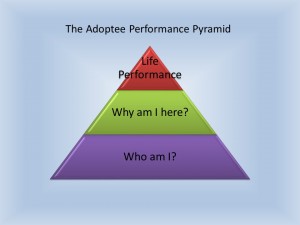 Who among you think that every belief and/or value is completely right or completely wrong? We have all developed our own thoughts, opinions, beliefs, values based on our experiences and situations but do you maintain that your opinions are 100% right without any gray area? Do you think there is absolutely no other way to feel about something and that people who do are just wrong? Something has been bothering me ever since I found the #adoption social media network. I have read the opinions and feelings of birth families, adoptive families and adoptees and as much as we preach about not speaking for us, I find that we actually do it to each other. I would like to give one specific example of this. I saw a tweet a few weeks ago that addressed the “silly cliches” that adoptive families and adoption agencies use to make us adoptees feel better. It was implying that those cliches are senseless and only meant to pacify us and help us feel grateful that we’re adopted, which many feel is intentionally neglecting the real problems we have as adoptees. Here’s how I feel about those “silly cliches”: Those explanations made me feel good about being adopted. Does that horrify you? Do you think that I should be ashamed and that I was lied to and should be angry about that? Are you telling me to feel betrayed by my adoptive parents? Are you telling me how to feel, period? Each and every one of us has the right to feel any way we want about our own situations. Some adoptees may justifiably feel those cliches are dumb and shouldn’t be used but others, like me, love that my parents explained things to me in a way that made me feel good. What they said to me was true; I am special. Just as I don’t want anyone telling me to be mad about those explanations, I’m not telling you to be glad. You are more than welcome to be mad at them and you likely have a very good reason for not liking them! There are two sides to every situation, every feeling, every belief. Being an adoptee can be complicated and there is no absolute way to feel; there are good things and bad things and we all feel differently about it based on our experiences! There are many adoptees who did not benefit from adoption and who are traumatized because of it but there are also adoptees who had beautiful lives and are amazing people BECAUSE they were adopted. Adoption is unique to every single situation, just as every situation surrounding a pregnant woman is different. Some women are in a serious relationship with the father, some are not. Even those women who are in a committed relationship with the father have different circumstances. No two pregnancy situations are the same; they can be similar, but not the exact same. No two adoptive families are the same in the way they adopted or raised their adopted child. Why can’t we talk about being adopted with open minds and support that not everyone feels the same way about it? We need to embrace adoptees whether they are happy people, or not. It’s about healing, if you need healing, and about helping others. It’s not about raising pitchforks to happy adoptees, it’s about raising pitchforks to the fraudulent parts of the adoption industry and antiquated legislation that holds our identities prisoner. Some adoptees don’t even care about THAT but let’s not condemn them for it. There are plenty of us who do want to fight those injustices. Let’s take just some of that energy usually spent talking about all the things that may or may not have have made us miserable and band together in the one ideal that everyone can agree is wrong and tell the world what our rights are and fight for that. Imagine the power…
Who among you think that every belief and/or value is completely right or completely wrong? We have all developed our own thoughts, opinions, beliefs, values based on our experiences and situations but do you maintain that your opinions are 100% right without any gray area? Do you think there is absolutely no other way to feel about something and that people who do are just wrong? Something has been bothering me ever since I found the #adoption social media network. I have read the opinions and feelings of birth families, adoptive families and adoptees and as much as we preach about not speaking for us, I find that we actually do it to each other. I would like to give one specific example of this. I saw a tweet a few weeks ago that addressed the “silly cliches” that adoptive families and adoption agencies use to make us adoptees feel better. It was implying that those cliches are senseless and only meant to pacify us and help us feel grateful that we’re adopted, which many feel is intentionally neglecting the real problems we have as adoptees. Here’s how I feel about those “silly cliches”: Those explanations made me feel good about being adopted. Does that horrify you? Do you think that I should be ashamed and that I was lied to and should be angry about that? Are you telling me to feel betrayed by my adoptive parents? Are you telling me how to feel, period? Each and every one of us has the right to feel any way we want about our own situations. Some adoptees may justifiably feel those cliches are dumb and shouldn’t be used but others, like me, love that my parents explained things to me in a way that made me feel good. What they said to me was true; I am special. Just as I don’t want anyone telling me to be mad about those explanations, I’m not telling you to be glad. You are more than welcome to be mad at them and you likely have a very good reason for not liking them! There are two sides to every situation, every feeling, every belief. Being an adoptee can be complicated and there is no absolute way to feel; there are good things and bad things and we all feel differently about it based on our experiences! There are many adoptees who did not benefit from adoption and who are traumatized because of it but there are also adoptees who had beautiful lives and are amazing people BECAUSE they were adopted. Adoption is unique to every single situation, just as every situation surrounding a pregnant woman is different. Some women are in a serious relationship with the father, some are not. Even those women who are in a committed relationship with the father have different circumstances. No two pregnancy situations are the same; they can be similar, but not the exact same. No two adoptive families are the same in the way they adopted or raised their adopted child. Why can’t we talk about being adopted with open minds and support that not everyone feels the same way about it? We need to embrace adoptees whether they are happy people, or not. It’s about healing, if you need healing, and about helping others. It’s not about raising pitchforks to happy adoptees, it’s about raising pitchforks to the fraudulent parts of the adoption industry and antiquated legislation that holds our identities prisoner. Some adoptees don’t even care about THAT but let’s not condemn them for it. There are plenty of us who do want to fight those injustices. Let’s take just some of that energy usually spent talking about all the things that may or may not have have made us miserable and band together in the one ideal that everyone can agree is wrong and tell the world what our rights are and fight for that. Imagine the power…
Monthly Archives: October 2014
The Adoptee’s Formula for Top Life Performance
 Even the corporate world is starting to get that people are happier, therefore more productive, if you stimulate more than their brains. It requires going deeper than the surface when facing a task or an obstacle in completing a task. Cognitive skills are important but this theory maintains that your emotional state not only enhances your performance but also sustains it without depleting your health. The Harvard Business Review’s article called “The Making of a Corporate Athlete” states that people that have a deeper meaning and purpose sustain a high level of performance. Can’t we say the same in all aspects of our lives? Think about a person who knows their purpose in life, like a motivational speaker who is spreading awareness on something they’re passionate about. You can actually feel their energy and they can usually cause an effect in the people they talk to; aren’t they performing in their life? Aren’t they happy? Now think about someone who is lost in the world and can’t seem to find their purpose. They can be the smartest person in the world but feeling lost makes them unhappy. The constant searching and the focus on being unhappy keeps that person from performing to their fullest capacity in life. I see so many adoptees who struggle with this, always searching, searching, searching. What are they missing out on because they’re looking for their identity? Human nature is that we need to know who we are before we can find our purpose in life. Some adoptees will never be able to find out where they came from so let me offer a way of thinking that might help get past that. If you’re one of those adoptees who will never know, use the power of your brain and thoughts to convince yourself that you’re the first of your bloodline! You are the beginning and maybe your purpose is to start a bloodline with a special purpose: a bloodline who will always know who they are and where they came from or maybe you could create a legacy for your children and their children and so on. Be the first one and create your bloodline in the way you want and there is your purpose. Once you have a purpose, you can start performing in life and even more importantly, be happy. The Harvard article talks about training executives on this performance pyramid that takes into account their mind, body and spirit. We need to train in the same way for our lives and happiness. Be a leader in your own life. Be a performer. You have the power!
Even the corporate world is starting to get that people are happier, therefore more productive, if you stimulate more than their brains. It requires going deeper than the surface when facing a task or an obstacle in completing a task. Cognitive skills are important but this theory maintains that your emotional state not only enhances your performance but also sustains it without depleting your health. The Harvard Business Review’s article called “The Making of a Corporate Athlete” states that people that have a deeper meaning and purpose sustain a high level of performance. Can’t we say the same in all aspects of our lives? Think about a person who knows their purpose in life, like a motivational speaker who is spreading awareness on something they’re passionate about. You can actually feel their energy and they can usually cause an effect in the people they talk to; aren’t they performing in their life? Aren’t they happy? Now think about someone who is lost in the world and can’t seem to find their purpose. They can be the smartest person in the world but feeling lost makes them unhappy. The constant searching and the focus on being unhappy keeps that person from performing to their fullest capacity in life. I see so many adoptees who struggle with this, always searching, searching, searching. What are they missing out on because they’re looking for their identity? Human nature is that we need to know who we are before we can find our purpose in life. Some adoptees will never be able to find out where they came from so let me offer a way of thinking that might help get past that. If you’re one of those adoptees who will never know, use the power of your brain and thoughts to convince yourself that you’re the first of your bloodline! You are the beginning and maybe your purpose is to start a bloodline with a special purpose: a bloodline who will always know who they are and where they came from or maybe you could create a legacy for your children and their children and so on. Be the first one and create your bloodline in the way you want and there is your purpose. Once you have a purpose, you can start performing in life and even more importantly, be happy. The Harvard article talks about training executives on this performance pyramid that takes into account their mind, body and spirit. We need to train in the same way for our lives and happiness. Be a leader in your own life. Be a performer. You have the power!
